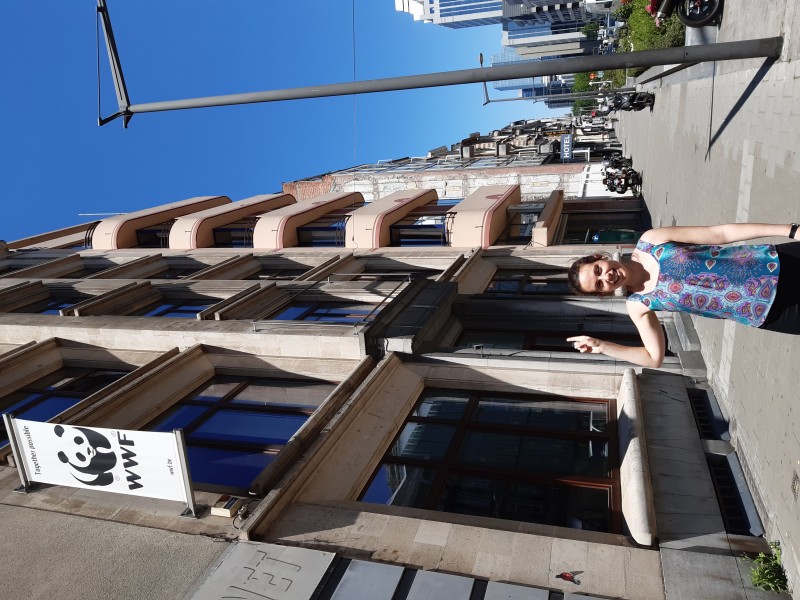Internship at WWF in Brussels
Ana Rodriguez
Heriot-Watt University

During the last three months I had the exciting opportunity to do an internship at the policy department of World Wide Fund for Nature (WWF) in Brussels, working on oceans and fisheries policy. This opportunity was made possible thanks to the Challenger Society travel award. Having just finished writing a first draft of my PhD thesis a week before starting the internship, I was keen for a new challenge, and excited to get immersed into the daily work of a large and influential nature conservation organisation.
Upon arrival, I was impressed by the amount of plants in each office, with portraits of majestic animals gazing from the walls and rooms filled with natural sun light. I also noticed that all products in the building were fair-trade and responsibly sourced. During lunch, I learned more about the work done in each department, from policy (my own), to youth programs, communication, fundraising and international programmes.
My daily work at WWF was very varied, with activities related to the three major ongoing ocean projects of my department: (1) marine protected areas and marine spatial planning in the North Sea, (2) sustainable fisheries in Belgium, and (3) deep sea mining in the Pacific Ocean. I participated in several meetings and workshops, but also spent much time reading about European policy. For instance, I participated in stakeholder engagement events on marine spatial planning, an NGO-organised workshop on deep-sea mining, a symposium on sea-level rise in the Flemish-Dutch delta and a training course on legal tools for environmental advocacy. Moreover, I worked on developing a framework to improve the sustainability on Belgian fisheries, based on successful strategies of other countries and on collaboration with fishermen to achieve win-win situations. This framework will serve as a draft guide to the policy’s department future work on sustainable fisheries in Belgium.
I also worked on a topic that this is close to my heart, because it is what I have been working on during my PhD: European oyster restoration. Several countries are currently engaged in restoring the European oyster, and Belgium is probably going to start soon too. I therefore participated in several meetings with industry representatives and scientists interested in restoring oyster, and wrote a document summarising the most relevant information for engaging in oyster bed restoration.
Overall, I have learned much during my internship, particularly on policy aspects of marine conservation, and on how to inform the decision-making process to reach policy targets. I have also increased my professional network, as I have met many new people from NGOs, industry and the scientific community. I am very grateful to the Challenger Society for enabling this experience.
Latest News
Royal Society Publishing Photography Competition 2025
Please see a message from the Royal Society below:
We are delighted to announce that the 2025 Competition is now open for entries until 15 August for a chance to win £1000! The competition celebrates the power of photography in conveying the wonder of science happening all around us and photographs can be submitted in the categories of: Astronomy, Behaviour, Earth Science and Climatology, Ecology and Environmental Science, and Microimaging.
The competition is free to enter and open to anyone studying or working in science at graduate level or above. Category winners will receive a one-year membership to the Royal Photographic Society and the overall winner will receive a grand prize of £1,000. Find out more: https://bit.ly/RSPphotocomp
October 2025 MEDIN Workshop: Marine Data Management, Governance and the MEDIN toolset
The Marine Environmental Data and Information Network (MEDIN) are pleased to announce that registration is now open for the next occurrence of our popular free online training workshop: ‘Marine Data Management, Governance and the MEDIN toolset’ on the 13th – 17th October 2025 on OceanTeacher Global Academy.
Marine Data Management, Governance and the MEDIN toolset
The Marine Environmental Data and Information Network (MEDIN) and OceanWise are delighted to invite you to attend our popular free online training workshop: ‘Marine Data Management, Governance and the MEDIN toolset’ on the 19th – 23rd of May 2025.
